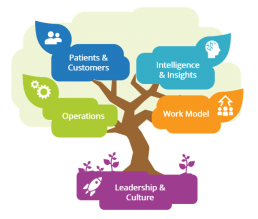The COVID-19 pandemic has fueled unprecedented levels of digital investment by European pharma and life sciences organizations.
The industry was already digitally mature even before the pandemic. Companies have been striving to leverage 3rd Platform and innovation accelerator technologies, developing strategies, and planning IT investments beyond systems modernization.
But COVID-19 has triggered a dramatic acceleration in that trend. According to IDC data, 71% of organizations plan to make technology investments to mitigate the impact of the recession or strengthen their DX efforts. The pandemic, caused by a novel virus, has sharpened the focus on life sciences DX investments to speed up the development of new diagnostic tests, vaccines, and therapies, optimize supply chain operations, and engage differently with patients and customers in the new competitive landscape shaped by COVID-19.
DX in European Life Sciences: Exploring the Five Dimensions
What does it take to become an intelligent life sciences enterprise? IDC Health insights has defined five key dimensions that are instrumental to achieving excellence in DX and becoming an intelligent life sciences enterprise:
Leadership and Culture
DX success is rooted in a digitally determined leadership that creates a “context-aware” DX vision. Digitally determined leaders nurture an organizational culture where DX is a core tenet to ensure resilience, strengthen employee engagement, improve customer and patient experience, and drive innovation and business performance.
Innovation was a priority for 65% of European life sciences firms, according to our survey on leadership and culture. Dynamically adapting digital road maps to fast-changing market environments and the broader ecosystem will ensure resilience, accelerate innovation, and drive performance.
Patients and Customers
About half of European life sciences organizations expect the biggest DX impact to be on improving patient and customer experience. The pressures created by the pandemic may hamper life sciences firms’ IT innovation plans in many areas, but not in this area. New digitally enabled offerings, such as IoT-based trial monitoring systems and AI-based intelligent health assistants, are supporting customer and patient excellence and helping to rebuild trust in the crisis recovery phase.
In the evolving scenario of value-based healthcare, it’s critical to gain a deeper understanding of patients’ and customers’ needs and perspectives. This enables organizations to design personalized offerings, improve patient outcomes, and maximize the value delivered to the ultimate beneficiaries.
Operations
COVID-19 has put enormous strain on life sciences supply chains and has highlighted major operational gaps. These pressures call for European life sciences companies to leverage the power of new and emerging technologies, such as AI, IoT, and robotics, to enable quality, speed, efficiency of operational processes, and intelligent decision support throughout.
Enabling intelligent data-driven operations across the whole value chain is critical for many business areas, from automating production processes to “virtualizing” clinical trials to building a new ecosystem around an intelligent supply chain.
Work Model
This is about creating a work model that supports human-machine collaboration, enabling new skills and improving worker experiences. COVID-19 has made it imperative for life sciences organizations to enable remote work and multistakeholder collaboration at scale.
Life sciences organizations must intelligently leverage technology solutions, such as R&D collaborative infrastructures and workforce management optimization, to accelerate work model transformation.
Intelligence and Insights
The ability to learn from multisourced data (including data from real-world sources) and generate insights at scale is critical to enable data-driven intelligent life sciences enterprises to thrive in the COVID-19 era.
European life sciences companies are increasing investments in analytic capabilities to speed up R&D, drive patient-centric innovation, support marketing and sales efforts, and optimize supply chain operations. Enabling intelligence and insights is emerging as a key differentiator in the European life sciences industry.
IDC Health Insights has surveyed European life sciences organizations’ DX investment priorities and trends across each of these dimensions. The results, along with essential guidance for life sciences companies and their tech vendors, are examined in depth in a series of survey reports published in the IDC Health Insights European Life Science and Pharma program.
Intelligent Enterprises Will Win the COVID-19 Race
Digital tools have proved to be essential to support the industry’s efforts to exponentially speed up R&D in all therapeutic areas, operate stretched supply chains, and address the key business priorities of operational efficiency, customer and patient excellence, and profitability.
In the new competitive landscape created by the pandemic, becoming an intelligent enterprise across the key dimensions of DX will be essential to minimize the impact of the crisis, build resilience, be well positioned for the “COVID-19 race,” and “future-proof” organizations for the post-COVID world.
To learn more, check out IDC Health Insights’ Digital Transformation in European Life Sciences report series as part of IDC’s European Life Science and Pharma research.
For more information on how we’re helping European life sciences companies to adapt to the next normal, please contact Nino Giguashvili and Silvia Piai.


